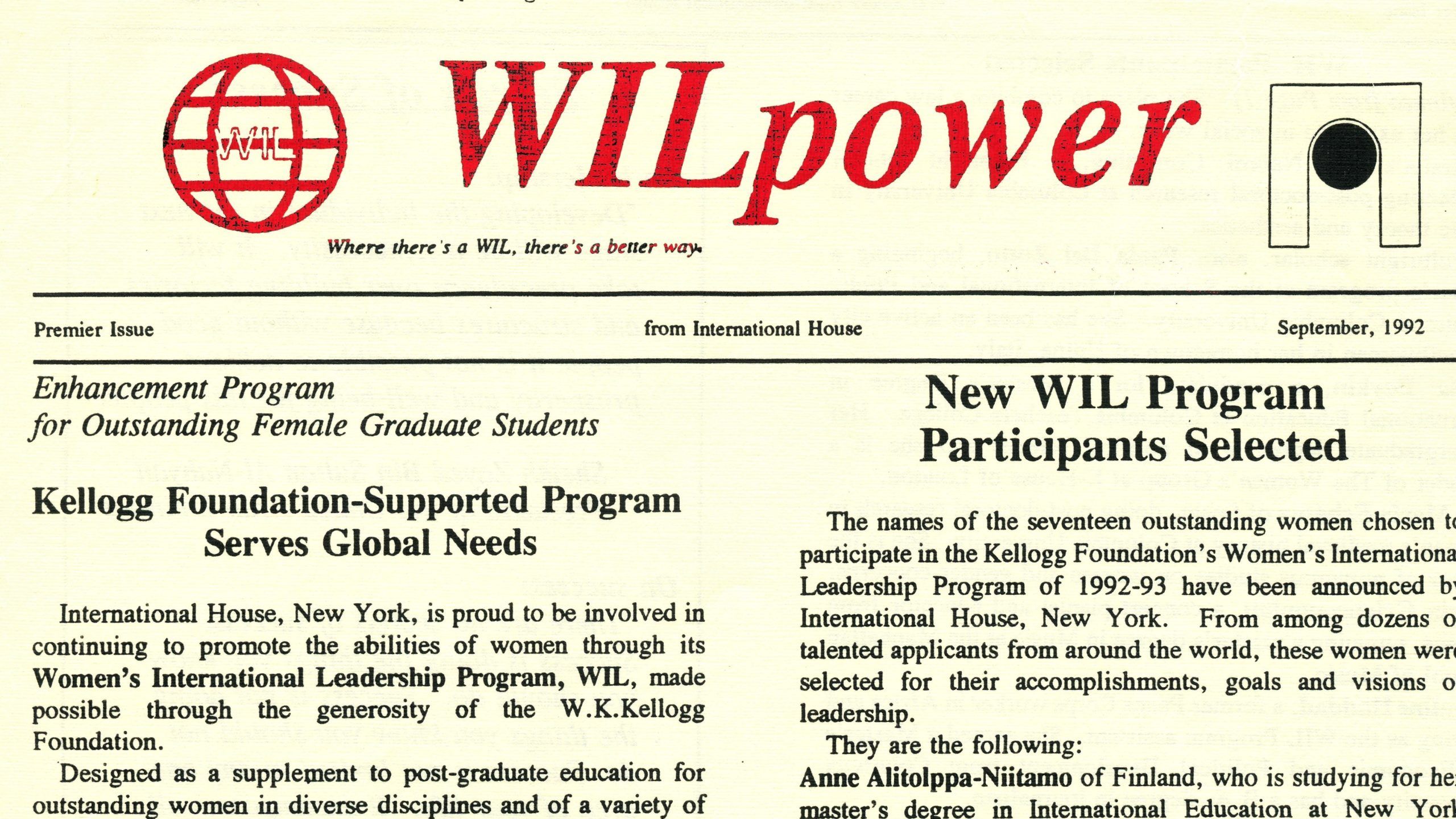
Celebrating Women’s International Leadership in the Archives
As we close out this year’s Women’s History Month, the International House Archives is proud to celebrate the Women’s International Leadership (WIL) program.




Want to support the Archives? Click below! Have a question? Please email Archives@ihouse-nyc.org. Support the Archives
WIL Harlem Exploration field trip, November 1995 / I-House Archives
For thirty years, WIL has offered a select group of outstanding residents two semesters of training, mentorship, and workshops to support and strengthen women’s leadership skills. The nine-month, part-time program is structured to supplement a post-graduate education for women from all different backgrounds and disciplines who share an ambition to enact positive change in the world. Through a series of planned and informal gatherings, WIL encourages participants to engage with their peers and develop a network of supportive individuals. Such activities include, but are not limited to, out-of-town weekend seminars, guest speakers, small group projects, and mentorship opportunities that focus on issues such as gender differences in leadership style, women as entrepreneurs, and building professional skills. With the ultimate mission to balance gender inequities ingrained in cultural and societal norms, WIL prepares and challenges its graduates to carry what they learn for leadership roles in business, government, and civil society in their respective nations.
WIL weekend with (left to right) Pamela Wen, Rajyashri Waghray, Gabriella Morvay, and Yoko Hirayama, 1998 / I-House Archives
The idea for the WIL Program began with Eleanor Spiegel, I-House Director of Programs and Resident Life from 1983-1992. Disheartened by a lack of progress, Spiegel aimed to develop a program to enhance women’s leadership skills and expose a cross-cultural group of individuals to new ideas. In the Fall issue of the 1991 Alumni World Newsletter, Spiegel said:“I think the recognition is that in almost every country, women are underrepresented in positions of leadership… it’s critical that opportunities be open to them and that society benefits from their wisdom.”
Originally called Women’s International Leadership Program (WILP), the program began in September 1991 with a grant provided by the W.K. Kellogg Foundation. In a letter dated October 30, 1990, I-House President Gordon Evans praised Spiegel, stating that her “leading assistance was essential to the development of this innovative program…and securing the grant from Kellogg to fund the project.”
Mentor Reception with WIL member Ali Vazquez (far left), WIL program fellow Jessica Greenstein (purple sweater), and WIL Program Director Ellie Spiegel (far right), 1992 / I-House Archives
More recently funded through the generosity of Bayer, WIL has made it possible for more than 500 diversely talented women from all over the world to gain specialized skills and valuable training. WIL graduates include I-House alumna Lisa Dolberry Hancock ’92, who leads the Obama Foundation Scholars Program at Columbia University; Arundhati Katju ’17, who was named one of Time Magazine’s 100 Most Influential People in 2019 after winning a landmark case to uphold LGBQT+ rights in India, overturning a 157-year-old law in front of the Indian Supreme Court that criminalized homosexuality; and Aizhan Kapysheva ’19, a member of the World Council of Alumni who is working to eradicate poverty and inequality as UNDP’s Head of Solutions Mapping in her home country of Kazakhstan.
WIL Women’s Week event brochure, 1993 / I-House Archives
Unfortunately, women are still grossly underrepresented in leadership positions and are more likely to be the target of bias and discrimination based on their gender and race.* According to a 2020 UN report, less than 50% of working-age women are in the labor market, a figure that has barely changed over the last quarter of a century. Women have also been disproportionately affected by the COVID-19 pandemic. Millions have lost their jobs and livelihoods, while others have left work to care for children and other family members at significantly higher rates than men. Even though WIL was suspended this year due to COVID-19, the disparities created by this pandemic have served to remind us that programs such as WIL are critical and must continue. “Where there is a WIL, there is a better way.”
WIL weekend wilderness retreat, September 1995. Anja Mergel (green) and Johanne Nigel (white) rockclimbing / I-House Archives
*Inequality faced by transgender women as well as gender non-conforming and non-binary individuals occur at drastically higher rates. Compared to the cisgender population, this group of individuals suffer more from prejudices in the workforce and employment, have higher levels of domestic violence, higher rates of hate crimes, especially murder, and higher levels of police brutality.Want to support the Archives? Click below! Have a question? Please email Archives@ihouse-nyc.org. Support the Archives
